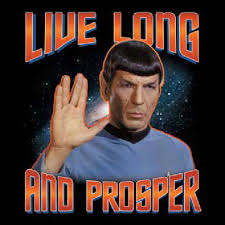Diablogue #7

Captain’s Log Star Date April 02, 2017
Helpful Hint: All manners of language by all people should be accepted. We would do well to follow the lead of the Vulcan mantra:
“Infinite diversity in infinite combination.” ~ Mr. Spock

So, let’s diablogue:
Ken: In our previous posts we stated that we would attend to some comments concerning my use of formal language, which I refer to as Spock Talk.
Christina: Yes. It’s always been part of your charm.
Ken: Affirmative, and thank you.
Christina: I’ve liked the way you talk and write…the precision and elegance of it. But I know some people find it off-putting. And lately, in the blog, it seems to be getting more pronounced. My brother even asked, playfully, “is Ken trying to talk like Spock on purpose?”
Ken: I spoke like this before Spock. In September of 1966 I watched the premiere of Star Trek and heard Spock talk. I was fascinated and obsessively hooked. Finally, here was someone who spoke like I did… even used the same words such as ‘fascinating,’ ‘affirmative,’ ‘specify,’ ‘inquiry,’ I shall endeavour to do so’….
Christina: You love that kind of language.
Ken: Correct. I think formal language is beautiful— so accurate, so logical, like a piece of classical music. It is difficult if not impossible to mistake or infer the incorrect meaning with formal language.
Christina: Classical music?! So, Spock talk is… uh, Bach?! That’s…
Ken: (interjecting, laughing) That is brilliant. You could not have picked a better example. He is considered the most formal of classical music composers. And he is thought to have been on the spectrum….
Christina. (interjecting back) Well, it just rhymed with Spock. And Talk. So… what kind of music is casual language?
Ken: To me, informal language sounds like folk music and/or country music. The trick for me has always been to use the appropriate music—language—for the situation.
Christina: Right. If you broke out a country guitar at the symphony you’d be chased out of the hall! I get it.
Ken: Correct. Ever since I could read, write, and speak, I stood out in some positive—but mostly negative ways. My classmates would tease me and make jokes about the way I talked—“Oh like at the snobby smarty pants.” Adults would say, “Oh that’s cute, look at the little professor.” However, it was only cute while I was a child.
Christina: So when you grew up, you started to self-censor.
Ken: True. I have literally had to spend my life pretending to not be who and how I am in order to avoid being ridiculed, abused, ostracized, tortured, and persecuted.
Christina: Those are strong words.
Ken: Nevertheless, they are the truth. In spite of what some people may assume, it has never been, is not now, nor will it ever be my conscious thought to be arrogant, superior, a snob or whatever traits they attribute to me. The language I use in this blog is honestly, sincerely, and genuinely the real me.
Christina: You’ve….
Ken: …started to let my guard down…
Christina: Yeah. Although not everyone on the spectrum talks like that.
Ken: Correct. Some are non-verbal, some speak only casual language, some speak or wish to speak as formally as I do, and yet others speak much more formally—yet do not suffer. This is why it is called the Autism Spectrum. To quote Dr. Stephen Shore, “If you’ve met one person with autism, you’ve met one person with autism.”
Christina: Right. Well, for most of us, though, Spock talk belongs to Spock.
Ken: And to me, I would add, and possibly to others. I am in no way trying to suggest that society should change its use of casual language to fit me. Nor do I in any way intend to persecute the persecutors, as casual language is beautiful in its own right. It is not only necessary, it is essential to and for creation, innovation, and evolution. All that I am asking for is reciprocity, validation, acknowledgement, appreciation, and understanding that my formal language is no less beautiful and essential. It is like Aspies ourselves, neither inferior nor superior, just different.
Christina: Everybody equal.
Ken: Affirmative.
Christina: Well, I love diversity. Your Spock Talk works just fine for me. Still charming…so… Spock on! Live long and….
Ken: Proper.
Christina: Oooooh! Nooooo! That’s Prosper.



Note:
Gene Roddenberry was considered to be on the spectrum. It is thought that he based the character Mr. Spock on himself.
Mr. Spock exhibits all the traits of an Asperger’s autistic.
Leonard Nimoy is also thought to be on the spectrum.
Next post: Dialogue #8- “How being an Aspie/non-Aspie couple is awesome”

Having watched children and adults who do not speak English with the local accent, especially from countries or areas that are considered less “developed”, they also are teased and sometimes end up being “tortured” for not being like “everyone else”. This is actually an instinctive tribal sort of thing that certainly is exacerbated during such times as we have now in the USA. So that is one part of your own history of being ostracized, etc. But perhaps an even bigger piece of why people call it “Spock talk” is the lack of inflection that many Aspies have, which correlates with not reacting to emotional cues, as you have mentioned: i.e. “not reading minds”. But there is even one more aspect which I have to take care to pay attention to: speaking with “big words” which makes less educated people feel demeaned. All of history shows how unaccepting too many of us are, so your blog will hopefully help in the ever-ongoing attempt to get humans to know how to be kind, eh?
LikeLiked by 1 person
Thank you, JoElla, for your continued support and salient observations about inflections and formal language. As do you, we hope that people will start to view these behaviours in a kinder light. Comments like yours are a source of essential inspiration for us. We intend this blog to become a community discussion.
LikeLike
Thoughtful comment, as usual, JoElla! That tribal instinct needs intensive work by all of us if we wish to evolve into a more hospitable people! Diversity IS the future. It always has been. Keep reading and commenting!
LikeLike
That’s great stuff. I am actually writing an advice book about the workplace for fellow people on the spectrum and I was thinking about including something about how we are often very formal in our speech and what effect that has on other people.
LikeLiked by 1 person
Thank you MR ASPERGER for you supportive comment! We’re glad you joined our conversation. An advice book about the workplace is an excellent idea. The vast majority of employable people on the spectrum are unemployed or underemployed because of poor fit. Usually the person with autism must do all the adapting, and it’s too wearing in the long term. Languaging, as you say, can be one major area of challenge and missinterpretation/misreading. If you want to talk with us and/or Ken more about this, feel free to email!
LikeLike